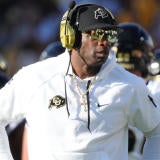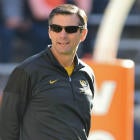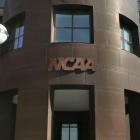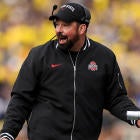Entering last weekend, there were nine undefeated teams left in the country, but only five of them made it through with that zero in the loss column. As a result, we saw some drastic changes in both the AP and Coaches Polls.
We do not see much of a major shift in these rankings.
With these rankings being data-based, at this point in the season, one loss isn't going to destroy your standing, unless it's a truly epic loss. The math takes a somewhat reasonable stance here. It's difficult to go undefeated, and most teams won't, so when one loss does come, as long as you've built a strong foundation, your house isn't going to crumble.
So while Boise State goes tumbling in the human polls, here, its drop is far less steep.
In fact, our entire top five from last week remains intact, and in the same order. The four unbeatens that lost were ranked No. 6, No. 7, No. 8 and No. 12 here last week, and all of them remain ranked in the top 15.
Again, the formula isn't as reactive as a lot of human voters. There's no recency bias.
Anyway, before we get to the actual rankings, here's a reminder on how the entire process works.
1. My opinion has absolutely nothing to do with the rankings. They are based on a mathematical formula of my creation. So keep this in mind before you call me an idiot, which I know you will.
2. There is true equality to start. The math doesn't play favorites. Before the season begins, defending national champion Alabama is just as good as our defending Bottom 25 champion Central Florida. The only factor that matters in the rankings is how you've performed on the field in 2016.
3. Wins and losses mean more than anything. I have a lot of different statistics involved, and I factor in strength of schedule, but at the end of the day whether you won or lost is going to mean more than anything else. Also, just because it's too difficult for me to rank FCS teams as well, my formula doesn't have much respect for FCS schools. If you beat one it won't mean much, and if you lose to one, well, you might show up in The Bottom 25.
4. The formula is in no way predictive. It is based on nothing but what has occurred in the season to this point in time. Just because a team is currently ranked No. 15 does not mean it's better or that it's going to beat a team ranked No. 35. It just means that, to this point, it has been the 15th-best team in the country. Think of it as a meritocracy in its purest form. The math plays no favorites. I put this here every week, but my inbox and Twitter mentions make it pretty clear you don't read it.
5. I won't share the formula. I just don't want to. I'm not a mathematician. I know my formula isn't perfect. I don't think a perfect formula can exist, so I don't share it because I don't care what anybody thinks. So don't ask. Just know that, even if you don't agree with it right now, at the end of the season, it has been startlingly accurate.
Now let's assign some numbers to some teams.
1. Alabama 8-0 (Last week: 1)
2. Michigan 8-0 (2)
3. Washington 8-0 (3)
4. Louisville 7-1 (4)
5. Ohio State 7-1 (5)
6. Clemson 8-0 (9): As I've had to stress so often when it comes to these rankings, my opinion has absolutely nothing to do with these rankings. Well, that's not entirely true. I've always felt like wins and losses should mean more than anything when it comes to rankings, and I made sure the formula feels the same way. I just have no control over what the formula spits out every week, and you can rest assured that there are always teams ranked in spots I don't agree with in my personal estimations.
Clemson is one of those teams.
Were I to put together rankings based on my opinion, Clemson would be a top-four team, and it would definitely be ahead of a Louisville team its beaten. If I was ranking based on resume, I would have Clemson No. 2. If I were doing it based on how I think it has played, I would have it at No. 4.
The rankings put it at No. 6, however, and a big reason why is the same reason I'd put it at No. 4 if I were doing rankings based on how the team just looks.
Clemson is a good team, obviously, but it's not a juggernaut, nor is it playing like one. The defense is exceptional, particularly up front, but the offense is just good. It's not very good, it's not great, it's just good, and it feels like it can be so much better.
As a result, while teams like Alabama, Michigan and Washington are blowing out some of their opponents, Clemson's just not. It has beaten South Carolina State and Boston College by a combined 105 points, but its other six wins have come by an average of 7.83 points per game, and that's affecting it in these rankings.
7. Western Michigan 8-0 (11)
8. Auburn 6-2 (10)
9. Baylor 6-1 (6)
10. Florida 6-1 (13)
11. Boise State 7-1 (7)
12. Texas A&M 7-1 (17)
13. Nebraska 7-1 (8)
14. San Diego State 7-1 (14)
15. West Virginia 6-1 (12)
16. Colorado 6-2 (18)
17. Virginia Tech 6-2 (19): I've become pretty popular amongst Virginia Tech fans this season because, before the season began, I was one of very few people who picked the Hokies to win the ACC Coastal Division. Now, I didn't do it because I'm smart, or that I really saw it coming. The basis of my selection was rather simple.
The ACC Coastal is a crazy place where strange things happen every season, so I didn't think picking North Carolina to win it for a second straight season would work out. While looking at the other teams, I saw a Virginia Tech team that had just made what I believed to be one of the best coaching hires of the offseason in Justin Fuente. The theory being that, if Fuente could turn Memphis into a winning program, he was going to be able to win games anywhere.
Now, here he was bringing a modern offense to Virginia Tech, and combining that with what is always a sturdy defense thanks to Bud Foster. I couldn't be sure how quickly things would turn around, but I thought that if the offense could just take a small step forward, and if the defense could continue playing well, we had a real darkhorse on our hands in Blacksburg.
And that's what has happened.
Last year's Hokies offense scored 25.4 points per game in conference play, and this season that number's gone up nearly 10 full points to 35.2. Meanwhile the defense has improved as well, going from 23.2 points allowed against ACC opponents last season to 17.2 this year.
Put all that together and you have a team very capable of winning the ACC's "other" division, and one with a shot at making me look a lot smarter than I actually am.
18. Oklahoma 6-2 (26)
19. Wisconsin 6-2 (21)
20. Penn State 6-2 (28)
21. LSU 5-2 (15)
22. Troy 6-1 (16): I've meant to write about Troy every week, but for some reason or another I keep putting it off. I can't do it this week. I have a favor to ask of any voters out there from the AP or Coaches Poll who just might happen to read this.
Vote for Troy.
Honestly, I know the College Football Playoff isn't going to do it because Troy is a Sun Belt team, but somebody needs to recognize what's going on with the Trojans this season.
This is a team that's 6-1. There isn't a win on the resume that's going to make you stand up and take notice, but it's a team that's won its six games by an average of 21.67 points per game. It's a team that's sole loss was a six-point loss to Clemson -- yes, Clemson -- on the road in September.
It's a team that deserves a spot on your ballot.
Not in the top 10, or even in the top 20, but it deserves a spot. So, please, when it comes time to fill out your ballot next week, if Troy is sitting there at 7-1, how about giving them a spot rather than some 5-3 team from a Power Five conference?
The Trojans deserve it more than they do.
23. Washington State 6-2 (22)
24. South Florida 7-2 (24)
25. Houston 7-2 (25)
26. USC 5-3 (31)
27. Oklahoma State 6-2 (32)
28. Appalachian State 6-2 (30)
29. North Carolina 6-2 (27)
30. Minnesota 6-2 (36)
31. Louisiana Tech 6-3 (43)
32. Toledo 6-2 (20)
33. Temple 6-3 (41)
34. Western Kentucky 6-3 (45)
35. Middle Tennessee 6-2 (39)
36. Tulsa 6-2 (42)
37. Utah 7-2 (23): I opened this week's Fornelli 50 by explaining how one loss isn't going to destroy your ranking at this point in the season, and while that's true, the same can't always be said of your second loss. Take Utah for an example. This was a Utah team that was 7-1 last week, yet only ranked No. 23. Then, after losing by only seven points against a Washington team currently ranked No. 3 in these same rankings, it tumbles 14 spots to No. 37.
So how does this happen?
Well, long story short, Utah's resume was always a bit light, and statistically, it wasn't exactly a favorite of the formula. Starting with the schedule, Washington was easily the best team the Utes had faced this year. The only other team on Utah's schedule currently ranked in The Fornelli 50 is No. 26 USC, which it beat.
Unfortunately, that win can only do so much to prop the Utes up.
Then there's Utah's overall performance against what's been a light schedule. Yes, it's won seven games, and those always mean a lot, but this is a team that's been average at best offensively, and one that's average to below average on defense when looking at the statistics used to compile these rankings.
Because of that, a loss -- even one against a team like Washington that boosts Utah's SOS -- can have a major impact on Utah's standing, and it did.
38. Iowa 5-3 (37)
39. Tennessee 5-3 (35)
40. Ohio 6-3 (48)
41. Georgia Tech 5-3 (Not ranked)
42. Army 5-3 (50)
43. Air Force 5-3 (NR)
44. Florida State 5-3 (38)
45. Texas 4-4 (NR)
46. Navy 5-2 (34)
47. Stanford 5-3 (NR)
48. Maryland 5-3 (33)
49. Wyoming 6-2 (NR): When Wyoming hired Craig Bohl after the 2013 season, I thought it was not only an interesting move, but a strong hire for the program. There's never any way to know if a coach will be a sure-fire success at any school, particularly when you're hiring a guy from a lower level like the FCS, but there are always signs you can look to.
One is that if a coach has won games consistently at a lot of different stops, and in different kinds of places, odds are stronger that he'll be able to win games at your school too. This is why I think Tulane hiring Willie Fritz this last winter was a stroke of genius on its part.
Then there was the kind of hire I already went over with Virginia Tech bringing on Justin Fuente. You don't just turn around a program like Memphis that quickly the way Fuente did without knowing what you're doing. This is why I think that Ohio State defensive coordinator Greg Schiano would be a good hire for someone this winter, because you don't do what he did at Rutgers without knowing what you're doing.
Then there's the Craig Bohl type of hire. North Dakota State was his first job, and he not only oversaw the schools transition from Division II to FCS, but from the Great West Conference to the Missouri Valley Conference. After going 20-2 in his final two seasons in the Great West, the Bison struggled a bit in their first three seasons in the Missouri Valley, but they improved a bit each season.
Then it all culminated in North Dakota State becoming a damn powerhouse. The Bison are the FCS' Alabama, and they won three straight national titles before Bohl left to take the Wyoming gig.
Things like that don't happen by accident, and I knew that when Wyoming hired Bohl, it was only a matter of time before the Cowboys became a thing in the Mountain West.
After watching them beat Boise State on Saturday night, I believe that time has come.
50. Pitt 5-3 (44)
No Longer Ranked: Memphis, Miami, TCU, California, Wake Forest





















